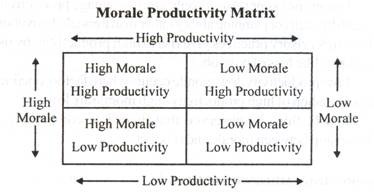Any morale improvement programme of management must embrace the following rules:
1. Respect the individual
2. be fair and just
ADVERTISEMENTS:
3. Encourage initiative
4. Design effective communication
5. Give fair compensation
6. Provide good work environment
ADVERTISEMENTS:
7. Provide job security
8. be alert
9. Leave door open
10. be courteous
ADVERTISEMENTS:
11. Point out individual prosperity is through company prosperity and company prosperity is national prosperity.
12. Adopt a how-shall-we-do-it attitude.
How the employees feel, what they think, why they think so, what their attitudes, opinions and morale are and how their opinions, attitudes, morale can be moulded to advantage both to the employee and management should be the concern of all levels of management—both line and staff and thus bring in beneficial results to the organisation.
ADVERTISEMENTS:
Table 7.1: Determinants of Morale
ADVERTISEMENTS:
1. Pride in and general attitude toward the company.
2. General attitude toward supervision
3. Satisfaction with job standards
4. Style of supervision
ADVERTISEMENTS:
5. Work load and work pressure level
6. Attitude toward co-workers
7. The level of worker satisfaction with salary
8. Attitude toward formal communication system in the company.
ADVERTISEMENTS:
9. Intrinsic job satisfaction of workers
10. Attitude toward fellow workers
11. Treatment of individuals by management
12. Worker satisfaction with the progress and opportunities for further progression.
Leaders Can Boost Morale:
An organisation’s progress, growth, development and image have lot of bearing on its leader. It is true for all commercial and non-commercial and service organisations. By leaders we do not mean only MD or CEO.
It applies equally to the top and middle level managers and supervisors. In poor and developing countries there is greater level of following of leaders than in developed countries. Hence leaders have to be role models.
ADVERTISEMENTS:
Leaders set trend or good examples. Their sense of timing, discipline, work involvement, promotion, care and concern for organisation and employees have a positive impact on employees down the line.
This gives them confidence that their job and future prospects are safe in the hands of a competent executive. This kind of a feeling give them security, high morale and more loyalty and organisation pride.
Executives like JRD Tata, Narayan Murthy, Azim Premji, Sir M. Vishwaraya, T.N. Sheshan, Abdul Kalam etc. have set such examples at national level. We come across thousands of executives at junior middle and top levels and in society to set examples to others in motivation and leadership.
